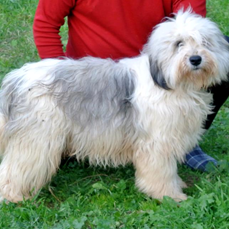| Lactose Intolerance (LI) is defined as the
inability to completely break down lactose due to a lack or
reduced production of lactase enzyme by the small
intestines. This is also referred to as Lactase Deficiency.
It the most common type of Carbohydrate Intolerance and a
possible trigger of digestive upsets in a considerable
number of Polish Lowland Sheepdogs.
In a review by Gudmand-Hoyer,published in The American
Journal of Clinical Nutrition (1994), The prevalence of
primary lactose deficiency varies and reaches almost 100% in
some Asian countries among human beings. This coincides with
Polish Lowlands originating from Tibet and carrying genes
for being double coated, herding and apparently Lactose
Intolerance among a significant number of the current
population in Europe and the USA.
A list of symptoms include:
- Abdominal pain - cramps and grumpy
moods
- Bloating - caused by the formation
of gases that expand in the warm conditions of the
digestive system
- Flatulence - caused by the gases
produced by the bacteria. H2S
is the gas associated with the odor
- Diarrhea- stools are usually bulky, frothy
and watery (most common symptom)
- Vomiting - unexplained vomiting after
digesting foods with dairy, etc.
In PONS, the most common symptoms are diarrhea, flatulence
and vomiting. Owners are often at a loss as to how to cope
with the above symptoms.
A veterinary test will confirm this condition and a
change of diet may be necessary. Reactions to dairy products
may vary and not all PONS need to avoid yogurt and foods
which contain varying levels of lactose. Foods containing
starch and gluten may also produce symptoms similar to
lactose intolerance. There are different types and degrees
of this condition and it may take a number of food trials
to determine an individual PON's reaction to particular
foods. Consequently, an elimination diet may prove most
helpful. This condition cannot be ignored because it may
result in canine malnutrition in it's extreme form.
Home cooking may prove most helpful because ingredients
can be controlled. Consider working with a qualified canine
nutritionist for a well balanced diet. Your family
veterinarian will be able to offer recommendations.
Sheepdogs as a group, are known for sensitive digestive
systems and it is an advantage to network with owners of
other sheepdogs about digestive issues. There is often no
quick fix and it is important to use common sense and
professional veterinary care when addressing health issues.
|

